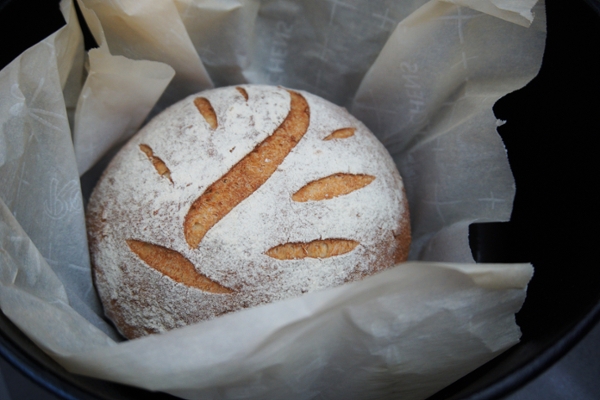
Re-discover the Value of "Basic" Life Skills
It appears that the coronavirus pandemic has triggered several unusual trends in the household. The first one that makes me scratch my head is “baking bread with sourdough”.
By Crystal Chan, Master of Public Policy student, Johnson Shoyama Graduate School of Public Policy, University of SaskatchewanIt appears that the coronavirus pandemic has triggered several unusual trends in the household. The first one that makes me scratch my head is “baking bread with sourdough”.
In the beginning, I thought it was only a few scientists looking for a new experiment to keep themselves busy at home. Then I thought it was a response to the (perceived) shortage of bread and the (real) shortage of yeast in the grocery stores. Now that the yeast supply is somewhat stabilized, I am mystified as to what is really driving this new baking trend.
Stress baking, anxiety baking, procrastibaking—we are all very familiar with these phenomena. But why sourdough?
Eating a slice of homemade sourdough bread, with melted butter on top, is certainly one of the most gratifying experiences in life. However, having a sourdough starter is essentially having a pet in the fridge. It needs to be fed on a regular schedule.
Sourdough baking also demands planning ahead and an intimate knowledge of the starter in hand. Getting the right loaf takes A LOT of practice, and that means many lessthan-stellar results before one gets it “just right”.
So why embarking on another stressful pursuit when the time is already tough?
Driven by concern over food supply and safety issues with the ongoing pandemic, people also plan on picking up vegetable gardening in the hope to be self-sufficient. I cannot help but wonder if we are bringing back the “victory gardens”?
Like breadmaking, growing vegetables is also an extremely rewarding experience—when you finally get to harvest them that is.
It takes about 4 weeks to grow leafy greens like spinach and 3 months to grow tomatoes. Also, keep in mind that birds and insects in your garden like eating vegetables too.
In the meantime, our government has been working overtime to come up with various relief and recovery programs, including financial support for students and new graduates. Interestingly, the Prime Minister also suggested our Canadian youth “might want to consider spending their summer working on a farm or in a fishery”1.
Labor shortage within the agriculture and fisheries sectors has been an issue and this pandemic surely adds to the stress in finding foreign workers. While it might sound logical to put unemployed young Canadians to fill those positions, asking people to travel to rural areas for temporary work goes against the current “stay home” pandemic mitigation strategy. More importantly, sending inexperienced workers to farms and fisheries could further reduce productivity and market value of the food products2.
To me, picking up breadmaking and vegetable gardening in the midst of a pandemic reflects how removed we are from the food production system. The food shortage is not caused by the pandemic itself.
It is because our supply chain and logistics operate under the principles of “just enough, just in time”. It can be easily disrupted by international trade issues. It cannot adjust quickly to a sudden spike in hoarding behavior and home consumption as all food premises are forced to close their doors overnight.
It is nice to be able to make food ourselves when we cannot buy it, but by now many of us have shared our “quarantine baking failures” on social media3. It turns out “basic” life skills are not so basic after all.
Skeptical as I might sound, I am very pleased to see people are re-discovering breadmaking and vegetable gardening as activities that are worth their time and attention. I really hope that people will continue to talk about them with passion long after this pandemic. Like our Prime Minister, I would encourage students and recent graduates to seek for a job on a farm or in a fishery. I would also urge farmers and fishermen to take in a city youth for a gig whenever possible. The best way to understand how our food system works is to “jump in with both feet”. Getting our Canadian youth to work directly with farmers and fishers will surely expand their horizon—I would even argue that it will be a life changing experience for some of them, as it shows that agriculture and aquaculture are indeed viable career options.
The coronavirus pandemic has revealed that our food production system, us individuals included, is highly efficient but lacks resilience. To better prepare ourselves in future crises, we need to build greater resilience into our food systems—it does not just mean making some significant changes within various food chains, but it also means equipping ourselves with important food cultivation, preparation, and preservation skills.
References
1“Students to get help from government, Trudeau says as slow summer job market looms” http://ctv.news/mJTN8gR, April 5 2020.
2 “Why it’s naïve to send unemployed Canadians to work on labor-strapped farms” https://business.financialpost.com/commodities/agriculture/why-we-cant-send-unemployed-canadians-to-work-on-labour-strapped-farms, April 29 2020.
3 Here is an example, https://www.buzzfeed.com/hayleyrochelletillett/quarantinebaking-fails
Crystal Chan
Crystal Chan was born and raised in metropolitan cities. She completed a Master of Science degree on cancer genetics at Queen’s University before life took her to Saskatoon, where she held several positions that involve developing and directing large-scale research and development projects. Crystal decided to return to school to study public policy in the hope to bridge the gap between city dwellers and farmers, and between technology and society. Her research focuses on the impact of digital technology on trust, relationship dynamics, and industry governance.

